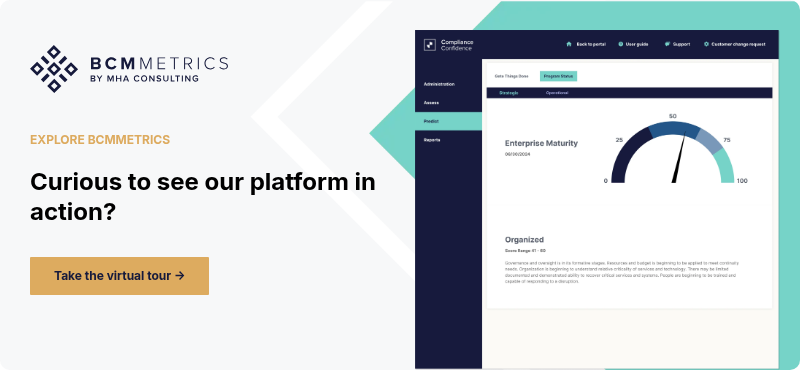Prepare For the Worst with the Best in the Business
Experience capable, consistent, and easy-to-use business continuity management software.
Managing business continuity (BC) without the right tools can be inefficient, time-consuming, and prone to errors.
For organizations looking to move beyond spreadsheets and simplify compliance, business continuity software provides a centralized way to track risks, develop response plans, and meet industry regulations. With many options available, choosing the right one requires careful evaluation.
To make your decision easier, we’ve rounded up the top five business continuity software solutions that stand out in 2025.
1. BCMMetrics
BCMMetrics was developed by MHA Consulting, a firm with over 25 years of experience in business continuity management. Their expertise, gained from working with companies like NASA, T-Mobile, and American Express, shaped this platform to address real-world continuity challenges.
BCMMetrics offers a suite of tools designed to simplify business continuity programs, including:
- Compliance Confidence – Evaluates program alignment with industry standards.
- BIA On-Demand – Conducts business impact analyses.
- BCM Planner – Builds and shares continuity plans.
- BCM One – Maps facilities and connects their recovery plans.
BCMMetrics delivers a straightforward, effective solution that is informed by decades of experience. It also enables you to cut 75% of your time on business impact analysis, as over 1,000 companies have done.
BCMMetrics delivers a straightforward, effective solution that is informed by decades of experience.
Pros:
- Intuitive, easy-to-use interface.
- Focused on core business continuity functions without unnecessary extras.
- Cost-effective compared to more comprehensive platforms.
- Developed by experienced continuity professionals.
Cons:
- May not include advanced features required by larger enterprises.
- Limited real-time incident management capabilities.
2. BC in the Cloud (by Everbridge)
BC in the Cloud is a cloud-based platform for business continuity and disaster recovery. It automates risk assessment, business impact analysis, plan development, and incident management while integrating with Everbridge’s emergency notification system. As it’s a more advanced platform, the setup requires a lot of time and effort. It is also a more expensive option.
Pros:
- Automated tools streamline continuity processes.
- Integrates with Everbridge’s crisis communication system.
- Scalable for businesses of various sizes.
Cons:
- Requires significant setup and dedicated resources.
- Higher cost compared to streamlined alternatives.
3. Preparis
Preparis emphasizes crisis management and employee preparedness. It includes emergency notification, incident response, and training tools to ensure staff readiness during disruptions. The platform is designed for ease of use, making it accessible to organizations that need a straightforward solution. For larger businesses, it may not have the depth required as it doesn’t have advanced BC planning capabilities.
Pros:
- Strong focus on employee training and preparedness.
- Simple interface for non-technical users.
- Effective crisis communication tools.
Cons:
- Lacks advanced business continuity planning features.
- May not meet the needs of larger, more complex organizations.
4. Fusion Risk Management
Fusion Risk Management is a feature-rich platform for business continuity, risk management, and IT disaster recovery. It includes response planning, dependency mapping, and advanced analytics for decision-making during disruptions. The platform is highly customizable for organizations with complex requirements. However, because it is so rich and customizable, it is harder to use and more expensive.
Pros:
- Comprehensive resilience features.
- Highly customizable.
- Advanced analytics and reporting.
Cons:
- Steep learning curve due to feature depth.
- Higher cost, which may be prohibitive for smaller organizations.
5. Noggin
Noggin offers a business continuity, risk, and crisis management platform with tools for incident response, compliance tracking, and plan development. Its modular design allows organizations to adjust the platform to their specific needs. This customization requires more time and resources for businesses, and the features may be too advanced for smaller companies.
Pros:
- Integrated approach to continuity and risk management.
- Customizable, modular design.
- Scalable for different business sizes.
Cons:
- Some features may be unnecessary for organizations needing only basic solutions.
- Customization may require additional time and resources.
BCMMetrics vs. Other Business Continuity Software
|
Feature |
BCMMetrics |
BC in the Cloud (Everbridge) |
Preparis |
Fusion RM |
Noggin |
|
Compliance & Regulatory Tracking |
Comprehensive compliance assessments (ISO 22301, FFIEC, NIST, HIPAA) with automated self-assessments |
Basic compliance tracking, not a core focus |
Limited compliance support |
Strong compliance tools within a broader risk management suite |
Comprehensive compliance but requires setup |
|
Business Impact Analysis (BIA) |
Built-in BIA On-Demand for structured impact assessments |
Automated BIA with some customization |
Basic BIA functions with minimal automation |
Advanced, customizable BIA tools requiring training |
AI-powered analytics for BIA but complex to configure |
|
Plan Development & Testing |
BCM Planner for centralized plan creation, testing, and maintenance |
Automated workflows for continuity planning |
Simple crisis communication and employee training plans |
Fully customizable planning features but requires training |
AI-driven plan development and testing for advanced users |
|
Ease of Use & Implementation |
Simple, intuitive, and requires minimal technical expertise |
Moderate learning curve due to automation complexity |
Very easy to use, ideal for non-technical users |
Requires customization and training, which can slow adoption |
Complex platform requiring expert setup |
|
Reporting & Executive Dashboards |
Real-time, audit-ready reports for compliance tracking and decision-making |
Basic reporting focused on incident management |
Limited reporting features, mainly for employee readiness |
Advanced analytics and reporting, but requires customization |
Customizable dashboards but can be overwhelming for new users |
How to Choose the Right Business Continuity Software for Your Organization
Selecting the right software requires careful consideration of several factors:
- Business Size & Industry: Choose software that aligns with your company’s size and sector.
- Compliance Needs: If you operate in finance or healthcare, ensure the software supports regulatory requirements.
- Scalability: Your software should accommodate growth, whether expanding locations or increasing operational complexity.
- Ease of Use: An intuitive platform encourages adoption. It won’t be effective in a crisis if employees struggle to use it.
- Expert Support: Software backed by industry professionals ensures you receive guidance beyond just the tool itself.
- Personalization: Tailor your software’s features based on your needs.
BCMMetrics is supported by MHA Consulting’s 25+ years of expertise. The company provides both software and the practical knowledge needed to build an effective continuity program. It also scales with you, as your needs adapt you can add new modules and features, ensuring you only pay for what you need.
Take the Next Step: See What BCMMetrics Can Do for You
Selecting business continuity software isn’t just about fulfilling a requirement—it’s about ensuring resilience, compliance, and operational stability.
While all platforms in this guide offer valuable features, BCMMetrics is an ideal choice for organizations that:
- Need a compliance-first approach with built-in regulatory assessments (ISO 22301, FFIEC, NIST, HIPAA).
- Want an easy-to-use, intuitive platform that doesn’t require technical expertise or IT-heavy setup.
- Require a structured, audit-ready BIA and continuity planning tool without unnecessary complexity.
- Are tired of managing BC with Excel and Word and need a single source of truth for their entire program.
BCMMetrics provides more than just software—the expertise of MHA Consulting, a firm with decades of experience in business continuity, backs it.
Don’t wait for the next audit or crisis to realize your program needs an upgrade. Join the companies that rely on BCMMetrics to simplify compliance, strengthen resilience, and save time.

Michael Herrera
Michael Herrera is the Chief Executive Officer (CEO) of MHA. In his role, Michael provides global leadership to the entire set of industry practices and horizontal capabilities within MHA. Under his leadership, MHA has become a leading provider of Business Continuity and Disaster Recovery services to organizations on a global level. He is also the founder of BCMMETRICS, a leading cloud based tool designed to assess business continuity compliance and residual risk. Michael is a well-known and sought after speaker on Business Continuity issues at local and national contingency planner chapter meetings and conferences. Prior to founding MHA, he was a Regional VP for Bank of America, where he was responsible for Business Continuity across the southwest region.
.png)
.png)




